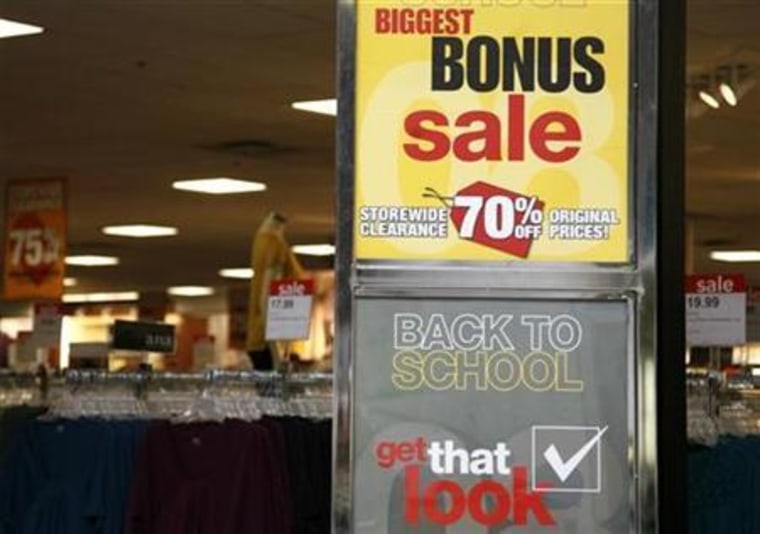Over the next couple weeks, 17 states will be partaking in tax-free holidays. Those states are Alabama, Arkansas, Connecticut, Florida, Georgia, Iowa, Louisiana, Maryland, Mississippi, Missouri, New Mexico, Ohio, Oklahoma, Tennessee, Texas, South Carolina, and Virginia.
A period of time to shop free of tax is pretty enticing, especially with "Back-to-School" spending in the air, but there are quite a few caveats, and every state is different.

“If your state has a holiday, make sure you know the times and dates, what items are tax free, or tax reduced, and then shop only for those products,” said Kay Bell, tax analyst with Bankrate.com.
Stores will likely be blasting you with promotions, but Andrea Woroch, consumer and money saving expert, noted that it’s important to do your homework ahead of time to make the most of the holiday.
“Before you jump on the first offer, research and compare prices,” said Woroch. “You can use apps like ShopSavvy for instant in-store price comparison, and leverage these findings to request a price match. Also, the Invisible Hand browser extension provides pop-up notifications if something you’re eyeing online is sold at another site for less. Use Trackif.com to track price drops as the site sends you sales notifications on products you’ve purchased so that you know when to request a price adjustment as most stores offer a seven-to-14 day window to do so.”
Below are the tax holidays, as designated by state, followed by what items qualify for state tax exemption. Lists of exceptions to the holiday may be quite lengthy and are subject to change, so be sure to check your state’s department of revenue website before heading out to shop.
July 29-30
Mississippi: Clothing and footwear that is less than $100. The city of Heidelberg isn’t participating and will still charge sales tax during this period.
July 29-31
Tennessee: Clothing and footwear that is $100 or less; computers that are $1,500 or less; school supplies that are $100 or less.
July 30-31
Georgia: Clothing and footwear (with the exception of a long list of clothing accessories such as jewelry, handbags, watches, and eyewear) that are $100 or less; computers and computer accessories that are $1,000 or less; school supplies that are $20 or less.
August 5-6
Iowa: Clothing and footwear less than $100.
Louisiana: Most tangible personal property that is $2,500 or less, excluding vehicles and meals.
August 5-7
Alabama: Clothing that is $100 or less; on computers, computer software, school computer supplies that are $750 or less; school supplies, school art supplies, and school instructional material that costs $50 or less. Books that are $30 or less are also tax-exempt.
Cities can opt out of or limit their participation. You can see who’s in and who’s out here.
Florida: Clothing, footwear, and accessories that are $60 or less; school supplies that are $15 or less. Not covered by the tax holiday are items sold at theme parks, movie theaters, or other entertainment venues, hotels, or airports.
Missouri: Clothing that is $100 or less; computer software that is $350 or less; personal computers and peripheral devices that are $1,500 or less; graphing calculators that are $150 or less; and school supplies that are $50 or less. Cities, counties, and districts can opt out and dozens have already done so.
New Mexico: Clothing that is $100 or less; computer peripheral devices that are $500 or less; computers that are $1,000 or less; and school supplies that are under $30.
Ohio: Clothing $75 or less each; school supplies that are $20 or less; school instructional materials that cost $20 or less.
Oklahoma: Clothing and footwear that is $100 or less.
South Carolina: No tax on bed linens, bath accessories, clothing, footwear, some clothing accessories, computers and computer software, printer and printer supplies, and school supplies. And there’s no price limit!
Texas: Clothing and footwear that is less than $100; backpacks less than $100; and school supplies less than $100.
Virginia: Clothing and footwear that is $100 or less; school supplies that are $20 or less; portable generators that are $1,000 or less; gas-powered chainsaws that are $350 or less; chainsaw accessories that are $60 or less, and other hurricane preparedness items that cost $60 or less. Also exempt from tax are Energy Star and WaterSense items that are more than $2,500 and bought for noncommercial home or personal use.
August 6-7
Arkansas: Clothing that is $100 or less and clothing accessories and equipment that is $50 or less. School supplies, school art supplies, and school instructional materials are also tax exempt and there’s no maximum.
August 14-20
Maryland: Clothing and footwear that is $100 or less.
August 21-27
Connecticut: Clothing and footwear that is $100 or less.
If your state isn't on the list, it's likely because state legislation had budgetary concerns, or didn't think the holiday would pay off in a big enough way. Bell notes that lawmakers are often torn about the benefits of tax free days, which are costly to the state.
"The holidays can cost state treasuries millions of dollars and when states opt out that's usually why," said Bell. "But shoppers, otherwise known as voters, like them, so when states decide to hold sales tax holiday even at a fiscal cost, it's because they want to keep voters happy."